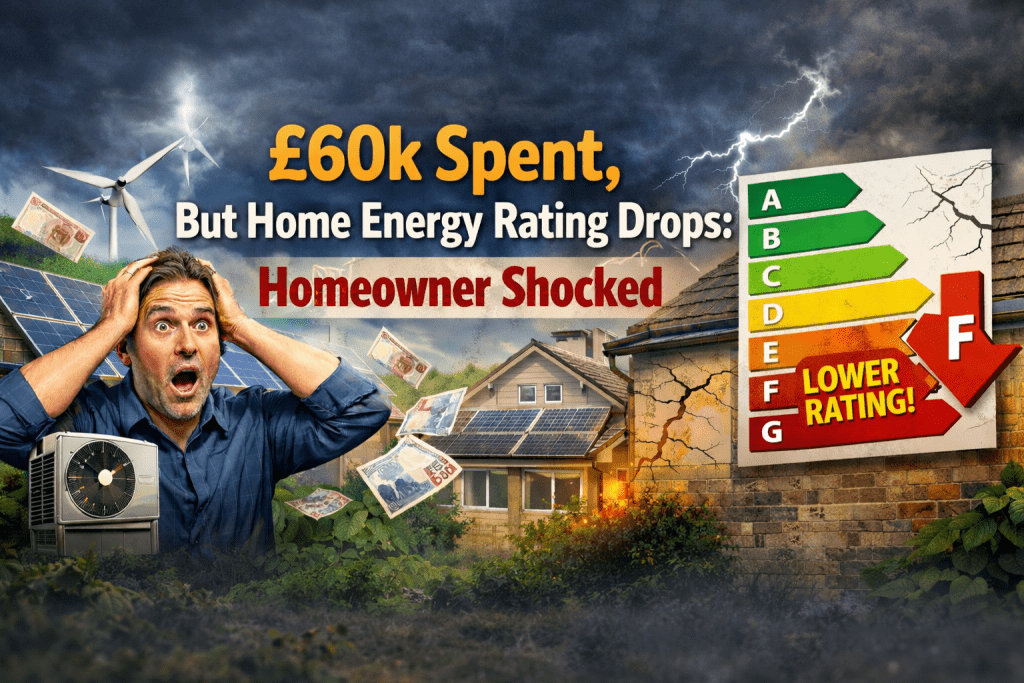A homeowner in west London spent £60,000 making his house more energy efficient, but was shocked when his home’s official energy rating went down instead of up. This story highlights problems with how energy ratings are given to homes and calls for the government to improve the system.
Big Spend on Eco Upgrades
Michael De Podesta owns a house built in the 1920s in Teddington, west London. He is a chartered physicist and wanted to make his home better for the environment and cheaper to heat.
Over time, he spent about £60,000 on green improvements. These comprised triple-glazing windows, solar panels, external insulation, and a heat pump. His home had a good score of B in terms of energy rating after the initial round of changes. So he kept improving the house.
Energy Rating Unexpectedly Falls
After finishing all the work, Mr. De Podesta was shocked when a new Energy Performance Certificate (EPC) showed his rating had dropped to C. This implied that he had paid a lot of money to make the house appear less energy efficient than previously. He said he “did not know what to believe” and felt the rating did not truly show the house’s energy performance.
Mistake Acknowledged and Apology Made
The company that did this latest energy check, Compass Property Projects, admitted that the rating was wrong. They apologized to Mr. De Podesta, gave him a refund, and put his rating back to B. Later, another evaluation even gave the house an A rating. The company explained that an energy rating is not a full survey of the entire building’s condition, but rather about how energy is used.
Problems with Energy Ratings
This case is not unique. Many homeowners have complained about errors in their EPCs. These certificates are important because they are needed to sell or rent homes in the UK, and soon, landlords must have a minimum C rating on all properties by 2030.
The software used for these ratings has received many complaints for mistakes. Experts say the current system is “out of date” and does not always reflect real energy use or costs, especially as gas and electricity prices change.
Calls for Government Action
The situation has led to calls for the government to review and update how energy ratings are done. One company that supplies software to assessors wants the government to fix the process and make it more accurate next year. The Department of Housing, Communities and Local Government is still looking at feedback and considering changes to rules around EPCs and energy ratings.
What This Means for Homeowners
For people investing in making their homes greener, this case shows there can be problems with official energy ratings. It can be frustrating when the official score does not match what homeowners see in lower bills and better comfort. The hope is that the system will improve to give fairer and more reliable information, which would help people make sensible decisions about energy saving.
Here is what you can fous to save on your energy spendings
Energy ratings are not just about what you install—they’re about how everything works together. A new window, wall, or heating system can actually worsen performance if it disrupts the home’s overall thermal balance.
Many homeowners assume that spending more automatically equals better efficiency. Unfortunately, energy assessments don’t reward cost—they reward measurable performance.
1. Aesthetics Over Performance
Some upgrades focused on appearance rather than insulation or airtightness. Large glass features and altered layouts increased heat loss, even though they modernised the home.
2. Incorrect or Incomplete Insulation
Insulation was added in certain areas but missed in others. Gaps, compressed materials, or poorly installed insulation can perform worse than older systems, especially if thermal bridging is introduced.
3. Ventilation Missteps
Modern homes need balanced ventilation. Sealing parts of the property without upgrading ventilation led to inefficiencies and penalised the final energy score.
4. Lack of Assessment Before Renovation
The biggest mistake was not involving an energy assessor at the planning stage. Without knowing how upgrades would be measured, decisions were made that unintentionally reduced the final rating.
If you’re planning a renovation, start with an energy assessment and roadmap. Identify which upgrades will genuinely improve efficiency, how they interact, and how they’re measured. A clear plan ensures every pound you spend moves your home in the right direction.

